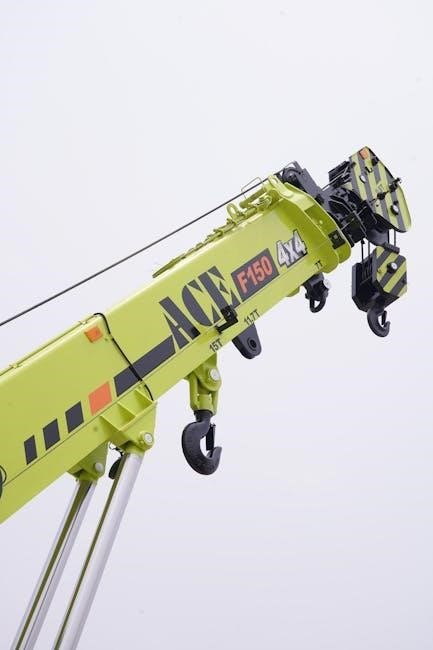TMS 402/602 provides comprehensive standards for masonry structures, covering design, construction, and specifications. These documents are essential for ensuring safety and compliance in masonry projects, available as PDFs online.
1.1 Overview of TMS 402 and TMS 602
TMS 402 and TMS 602 are comprehensive standards for masonry structures, developed by The Masonry Society. TMS 402 focuses on design and construction requirements, while TMS 602 outlines minimum construction specifications. Together, they provide a framework for safe and durable masonry construction. The 2016 edition (TMS 402/602-16) is widely referenced, offering updated guidelines for materials, testing, and structural design. These standards are essential for engineers, architects, and contractors involved in masonry projects. The documents are available as PDFs, ensuring accessibility for professionals seeking to comply with current masonry codes and specifications.
1.2 Importance of TMS 402/602 in Masonry Construction
TMS 402/602 plays a critical role in masonry construction by providing uniform standards for design, materials, and execution. These standards ensure safety, durability, and compliance with building codes, protecting both structures and occupants. By adhering to TMS 402/602, professionals can mitigate risks associated with masonry construction, such as structural failures. The guidelines also promote consistency across projects, facilitating smoother inspections and approvals. As a result, TMS 402/602 is indispensable for engineers, architects, and contractors, serving as a foundation for modern masonry practices and ensuring high-quality outcomes in construction projects.

TMS 402: Building Code Requirements for Masonry Structures
TMS 402 provides comprehensive building code requirements for masonry structures, formerly designated as TMS 402/ACI 530/ASCE 5, and is included in the TMS 402/602-16 document.
2.1 Scope and Application of TMS 402
TMS 402 applies to the design and construction of masonry structures, providing minimum requirements for safety, sustainability, and performance. It covers various types of masonry, including clay brick, concrete block, and stone. The standard is intended for use by engineers, architects, and contractors to ensure compliance with building codes. It addresses structural integrity, material specifications, and construction practices, ensuring masonry structures meet current safety standards. TMS 402 is part of the TMS 402/602-16 document, which also includes the specification for masonry structures, making it a comprehensive resource for the masonry industry.
2.2 Key Provisions and Updates in TMS 402-16
TMS 402-16 introduces significant updates to enhance the safety and performance of masonry structures. Key provisions include revised design requirements for seismic and wind loads, updated material testing standards, and improved detailing for reinforced masonry. The 2016 edition also clarifies construction practices and inspection criteria to ensure compliance. New provisions address energy efficiency and sustainability in masonry design. These updates reflect advancements in engineering and industry feedback, making TMS 402-16 a critical resource for modern masonry construction. The document is available as a PDF, providing easy access to the latest standards and guidelines for professionals.

TMS 602: Specification for Masonry Structures
TMS 602 outlines minimum construction requirements for masonry, ensuring quality and safety. It complements TMS 402 by detailing material standards and construction practices for masonry projects.
3.1 Purpose and Scope of TMS 602
TMS 602 provides minimum construction requirements for masonry structures, focusing on materials, execution, and quality control. Its purpose is to ensure masonry projects meet safety and performance standards. The scope includes specifications for materials like masonry units, mortars, and grouts, as well as construction practices such as laying, bonding, and reinforcement. It applies to all types of masonry, including clay, concrete, and stone. By adhering to TMS 602, professionals can ensure compliance with industry standards and achieve durable, structurally sound masonry construction. This specification is essential for contractors, engineers, and architects involved in masonry projects.
3.2 Minimum Construction Requirements in TMS 602
TMS 602 outlines minimum construction requirements for masonry, ensuring structures are safe and durable. It specifies standards for materials, including masonry units, mortars, and grouts, and details proper construction practices. Requirements cover unit placement, joint reinforcement, and bonding patterns to ensure structural integrity. The document also addresses tolerances, inspection, and testing to verify compliance. These guidelines are crucial for contractors and engineers to maintain quality and adherence to industry standards. By following TMS 602, professionals can ensure masonry projects meet essential performance and safety criteria, avoiding potential defects and ensuring long-term durability.

Design and Construction Requirements
TMS 402/602 provides comprehensive guidelines for masonry design and construction, ensuring structures are safe, durable, and compliant with industry standards. These standards cover materials, design loads, and construction practices.
4.1 Masonry Materials and Testing
TMS 402/602 details material standards and testing protocols for masonry construction. It covers requirements for concrete masonry units (CMUs), clay brick, mortar, and grout. Testing includes compressive strength of CMUs and brick, as well as mortar and grout properties. The standards specify minimum requirements for material performance to ensure durability and safety. Testing frequencies and methods are outlined to verify compliance during construction. Proper material selection and testing are critical to achieving structural integrity and meeting code requirements. These guidelines ensure masonry materials meet rigorous standards, promoting reliable and long-lasting structures. Adherence to these protocols is essential for compliance and performance.
4.2 Load-Bearing Masonry Design
TMS 402/602 provides detailed guidelines for load-bearing masonry design, ensuring structural integrity and safety. It outlines requirements for compressive strength, wall thickness, and reinforcement. Design provisions address axial loads, flexural stresses, and shear forces. The standards emphasize proper material selection and construction practices to resist seismic and wind forces. Engineers must adhere to these guidelines to ensure masonry structures can bear intended loads without failure. The document also includes design examples and webinars for practical application. Compliance with these standards is crucial for achieving durable and safe load-bearing masonry systems in various construction projects. Adherence ensures reliability and performance.
4.3 Reinforced Masonry Design
TMS 402/602 provides detailed provisions for reinforced masonry design, focusing on structural performance and durability. It covers design requirements for flexural strength, shear capacity, and reinforcement detailing. The standards address the use of steel reinforcement in masonry walls and beams, ensuring adequate strength and ductility. Design examples, such as reinforced masonry beams, illustrate practical applications of the code. Engineers must follow these guidelines to ensure reinforced masonry structures meet safety and performance criteria. The document also includes updates and webinars to aid in understanding and implementing reinforced masonry design effectively. Compliance ensures reliable and resilient structures. Proper reinforcement is critical.

Changes in TMS 402/602-16
TMS 402/602-16 introduced key updates to design provisions, material requirements, and construction practices. These changes enhance safety, clarity, and compliance, reflecting modern engineering advancements and industry needs.
5.1 Summary of Revisions in the 2016 Edition
The 2016 edition of TMS 402/602 introduced significant updates to enhance clarity, safety, and compliance. Key revisions included improved design provisions, updated material requirements, and expanded construction guidelines. The code now addresses advanced engineering practices and aligns with modern industry standards. Changes also focused on streamlining inspection processes and providing more detailed specifications for reinforced masonry. These revisions ensure that masonry structures meet current safety and performance expectations, reflecting advancements in materials and construction techniques. The updates are summarized in the TMS 402-16 document, which is available as a PDF for reference.
5.2 Impact of Changes on Masonry Projects
The 2016 revisions to TMS 402/602 have significantly influenced masonry projects by enhancing safety and compliance. Updates to design provisions and material requirements ensure structures are more durable and meet modern standards. The changes also streamlined inspection processes, reducing delays and costs. Engineers and contractors now have clearer guidelines, leading to more accurate designs and constructions. The revisions promote consistency and quality across projects, ensuring masonry structures are safer and more reliable. These updates are particularly beneficial for reinforced masonry designs, where adherence to the new standards is critical for performance and longevity.

Applications of TMS 402/602
TMS 402/602 is widely applied in CMU masonry design and reinforced masonry beam design, providing engineers with practical examples and guidelines to ensure compliance with code requirements effectively.
6.1 CMU Masonry Design Examples
TMS 402/602 provides detailed guidelines for designing Concrete Masonry Unit (CMU) structures, including shear walls and reinforced masonry elements. Engineers utilize these standards to ensure compliance with safety and structural integrity. The documents offer practical design examples, such as CMU shear walls, highlighting proper reinforcing techniques and code requirements. These examples are invaluable for professionals, enabling them to apply theoretical concepts to real-world projects effectively. By adhering to TMS 402/602, designers can ensure their CMU masonry projects meet both functional and regulatory standards, making these documents indispensable for modern masonry construction. The PDF versions of TMS 402/602 are readily accessible online for reference.
6.2 Reinforced Masonry Beam Design
TMS 402/602 provides detailed design requirements for reinforced masonry beams, ensuring structural integrity and compliance with building codes. Engineers use these standards to calculate flexural strength, shear capacity, and reinforcement detailing. The documents include practical examples, such as reinforced masonry beam design, to guide professionals in applying theoretical concepts. By following TMS 402/602, designers can ensure beams meet safety and performance standards. The PDF versions of these standards are accessible online, offering comprehensive guidance for masonry beam design. These resources are essential for engineers to deliver structurally sound and code-compliant masonry projects, making TMS 402/602 indispensable for modern construction practices.

Code Compliance and Enforcement
TMS 402/602 ensures compliance with building codes through detailed inspection and verification processes, guaranteeing masonry structures meet safety and regulatory standards. Proper enforcement is critical for reliability.

7.1 Role of TMS 402/602 in Building Codes

TMS 402/602 plays a critical role in building codes by providing standardized requirements for masonry structures. These documents ensure safety, durability, and compliance with regulatory standards. TMS 402 focuses on design and construction aspects, while TMS 602 outlines minimum construction requirements. Together, they form a comprehensive framework for engineers, architects, and contractors to follow. By adhering to these codes, professionals can ensure that masonry projects meet industry standards and local building regulations. This harmonized approach promotes consistency and quality in masonry construction across various jurisdictions.
7.2 Inspection and Verification Processes
Inspection and verification processes are essential to ensure compliance with TMS 402/602 standards. These processes involve on-site inspections to verify that masonry construction meets specified requirements. Inspectors check materials, workmanship, and structural integrity, ensuring adherence to design and specification details. Verification also includes documentation reviews to confirm that all aspects of the project align with the standards. Regular inspections help identify and address potential issues early, ensuring the safety and durability of masonry structures. These processes are critical for maintaining quality control and ensuring that projects meet both code requirements and industry best practices.

Resources and References
Access TMS 402/602 PDFs through official sources or websites like skghoshassociates.com. Webinars and training sessions are also available for in-depth understanding of the standards and their applications.
8.1 Accessing TMS 402/602 PDF Documents
TMS 402/602 PDF documents can be accessed through official sources like skghoshassociates.com or other reputable platforms. These documents are often available for purchase or download, ensuring compliance with the latest standards. Webinars and training materials are also provided alongside the PDFs, offering detailed insights into the code requirements and specifications. It is crucial to obtain these documents from verified sources to ensure authenticity and accuracy. The PDFs cover both TMS 402 (Building Code Requirements) and TMS 602 (Specification for Masonry Structures), making them indispensable for professionals in masonry construction and design.
8.2 Webinars and Training on TMS 402/602
Webinars and training sessions on TMS 402/602 are available through platforms like skghoshassociates.com, offering insights into masonry code changes and their practical applications. These sessions cover topics such as CMU masonry design, reinforced masonry beams, and compliance requirements. Professionals can access recordings of past webinars, providing flexible learning opportunities. Training materials often accompany the TMS 402/602 PDF documents, ensuring a comprehensive understanding of the standards. These resources are invaluable for engineers, architects, and contractors seeking to stay updated on the latest masonry design and construction practices.
TMS 402/602 standards are crucial for masonry construction, ensuring safety and compliance. Their updates and resources, like PDFs and webinars, guide professionals in modern masonry practices.
9.1 Final Thoughts on TMS 402/602
TMS 402/602 standards are essential for modern masonry construction, providing clear guidelines for design, materials, and compliance. Their updates ensure safety and innovation in the industry. Accessing these documents as PDFs and staying informed through webinars or training is crucial for professionals. These standards not only streamline processes but also enhance the quality of masonry projects. As the industry evolves, TMS 402/602 will remain a cornerstone for achieving structural integrity and code compliance, making them indispensable for engineers, architects, and contractors involved in masonry construction.
9.2 Future Developments in Masonry Standards
Future updates to TMS 402/602 will likely focus on sustainability and innovative materials, aligning with industry trends. Advances in technology, such as BIM integration, may be incorporated to enhance design and compliance processes. As building codes evolve, TMS standards will adapt to address emerging challenges like seismic resilience and energy efficiency. Regular revisions will ensure the standards remain relevant, reflecting advancements in masonry construction. Professionals can expect expanded guidelines for new materials and techniques, ensuring safer and more durable structures. Staying updated through resources like webinars and PDF documents will be crucial for adapting to these future developments.
